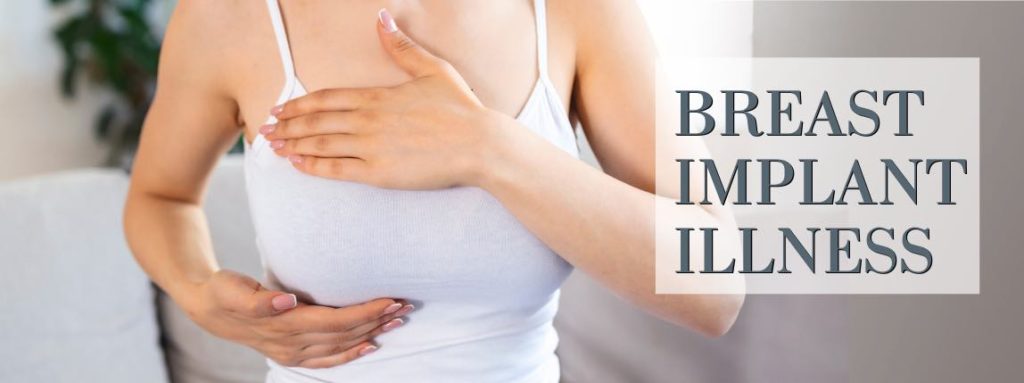What You Need to Know About Breast Implant Illness
Breast procedures for shape and size change are as popular now as ever. While breast implants remain in demand globally, the desired outcome from breast surgery is changing for many.
More women of all ages are interested in options for breast shape and size that is more natural-looking and complimentary to their body. And even though according to the American Society of Plastic Surgeons, 300,000 augmentations are performed annually in the United States, many women are also opting to have their implants removed altogether.
The decision to remove breast implants may be a decision of body image, and realization that at some point, implants will need to be removed, replaced or revised. For many, breast implants are uncomfortable, painful, interfere with activity, and contribute to breast larger than desired over time.
Currently for many women, it’s a matter of health. There is reason to believe that breast implants can make some women so sick that removal may be their best hope for feeling like themselves again.
Today there are 1,000s of women with a variety of symptoms and “health” issues who have positively recovered after breast implant removal and report “Finally feeling like themselves again”.
If you have breast implants or are considering breast augmentation, then you have likely heard of Breast Implant Illness, or BII. Information available regarding BII is at best confusing. Debate spirals over the risks of breast implants, and there is an abundance of conflicting information, both for patients and for physicians. We’re here to help you make sense of breast implant safety, implant removal, and alternatives to implants.
WHAT IS BREAST IMPLANT ILLNESS?
While most women who have breast implants are happy with them and don’t develop any health problems, an increased awareness around the health implications of breast implants has resulted in a surge of patients who do report symptoms of Breast Implant Illness.
BII is a term used to refer to a constellation of symptoms that can develop after undergoing breast cosmetic augmentation or reconstruction or using breast implants. It is also sometimes referred to as autoimmune/inflammatory syndrome induced by adjuvants (ASIA).
Women who self-identify as suffering from this condition not only feel their symptoms are directly connected to their saline or silicone breast implants, they also have a high percentage chance of improved health and reduced symptoms after implant removal when carefully screened. BII impacts each person uniquely.
Symptoms of BII can include:
- Chronic fatigue
- Hair loss
- Memory and concentration problems (“brain fog”)
- Muscle aches and joint pain
- Anxiety
- Rashes and skin problems
- Headaches
- Breathing problems
- Cardiac Issues (palpitations, concerns for irregular heart rhythm)
- Gastrointestinal (Food sensitivities)
- Autoimmune issues
- Depression
- Neurologic issues
- Hormonal issues
- ENT (Ear ringing)
- Unexplained Weight Gain
One of the most common complaints is extreme fatigue that does not resolve with adequate rest. These symptoms can appear any time after implant surgery, whether immediately or after several years.
BII isn’t new. Women have been complaining of issues with their implants since the 1990s. However, the many celebrities who have recently opted to have their implants removed as well as the growing conversations about breast implant safety on social media have generated a collective awareness around this illness.
It’s important to note that BII is not recognized by the medical industry yet as a diagnosis. That also means there is no medical code for BII, so breast implant removal (also known as explant surgeries or breast implant extraction) is not covered by insurance. Because BII isn’t a disease for which doctors can explicitly test, determining whether someone’s symptoms are related to their implants is typically a process of elimination of other possible causes. This lack of objective lab evidence has contributed to some skepticism around this condition; however, the stories published on Georgia Public Broadcasting’s website of women who claim to be suffering from BII are extremely compelling.
And in our practice, positive patient results after removal of 100’s of implants is not possible to ignore.
While a causative relationship has not yet been established, research being conducted by multiple groups including the American Society of Plastic Surgeons continues to search for answers which further underscores the need for more research in this area.
WILL REMOVING MY IMPLANTS CURE MY BII?
Dr. Randy Rudderman, is a renowned expert in breast implant removal. Women who come to our office for an evaluation are often sent by their general practitioner, rheumatologist, or concerned friend or family member, and commonly women who have been been under our care for BII.
Some have had their BII symptoms entirely dismissed by other surgeons or healthcare providers who may not consider connecting their symptoms with their breast implants. This often leads women to feel frustrated, unheard, and even depressed.
It is too common for women to feel that they have to first state that what they are experiencing is real, but they feel like they sound “unreasonable”. We always listen to the concerns of our patients and are here to help them find relief from their symptoms. And during the consultation, most commonly we can help support many combinations of symptoms that may have a chance of resolving with implant removal. We also understand that the decision to take out implants is not often an easy one, and is associated often with anxiety, especially when no one can guarantee the procedure will alleviate their symptoms.
While it’s not possible to accurately predict if the removal of implants alone will positively impact their health, many women report significant and often dramatic improvement in concerns soon after implant removal. Some experience such significant improvements that they find they can reduce or eliminate other medications that they have been taking—often for years—to treat symptoms. Women have seen rashes resolve, hair growth resume, allergies subside, pain resolve, cognitive brain function improved, all well beyond what would be expected by placebo alone.
WHAT CAUSES BII IN WOMEN?
Breast implant illness direct connection to cause is not known. We do know today that many patients develop capsular contractures over time, and that many are associated with biofilms. Biofilms in these cases are often bacterial that usually reside in your breast tissue, then over time attach to the surface of the implant.
This is not an “infection” and cannot be resolved with antibiotics. In most cases there may be no consequences observed. In some however, an inflammatory reaction may occur resulting in tightening of the capsule, the natural tissue that forms around any implant. Biofilms are so well documented that implant manufacturers provide a warranty for capsular contractures when they occur to replace the implants with a new one, because returning the original implant with bacteria attached will like lead to capsular contracture recurrence.
It is possible that certain individuals have a sensitivity to the implant materials, and how the materials behave after implantation. It is also suspected that some women have an allergic predisposition to the small amounts of metals found in implants. A much smaller number of women have been found to react as well to textured surface implants, both saline and gel, that leads to a stimulated immune state and eventually a lymphoma.
Women’s immune systems also react differently to foreign objects in the body, making it nearly impossible to determine a woman’s risk of breast implant illness before the surgery. Any of these factors or even a combination of these factors may be the cause of BII symptoms in women.Seeking Evidence
SEEKING EVIDENCE
In our practice, we daily seek empirical evidence that is both quantitative (measurable) and qualitative (obtained by observation) to help uncover answers to this question that can have serious and important impact to many.
Over 90% of our clients that undergo breast implant removal report total or near total resolutions of symptoms and concerns. Of course, implant removal is not magic, and will not cure preexisting genetic or other disease. However, for those patients who have seen many physicians, had “million” dollar workups because the feel so bad, and lab results look “totally normal” on paper, a consultation may give you guidance to see if you fit the profile of patients that report doing well after implant removal.
ARE THERE ALTERNATIVES TO BREAST IMPLANTS?
Many women assume they must have implants to have well-proportioned breasts. The truth is, there are other techniques for breast reshaping. A breast lift, also known as mastopexy, lifts and repositions the breast to a higher, more youthful position without the need for implants. A remodeling procedure done to restore shape after implant removal can provide surprisingly attractive and comfortable results.
Even with very small breasts, repositioning breast tissue into a more symmetric and better space makes breasts appear to have more projection, provides a more aesthetically pleasing breast shape, and helps women feel more comfortable and confident in bras and clothing off the rack. Dr. Rudderman is specialized in many surgeries of the breast and can perform artistically demanding and rewarding surgeries that correct problems and restore confidence.
WHAT ARE THE REASONS WOMEN HAVE BREAST IMPLANTS REMOVED?
With more awareness around BII, many women sufferings from these otherwise inexplicable symptoms are having their implants removed in hopes of finding relief. But there are many reasons why women are choosing to remove their implants or downsize their bust, including:
- Changing body ideals: A cultural focus on fitness and the trend toward a more natural shape is causing many women to trade in their DD cups for Bs.
- Upkeep: Implants are not lifetime devices, and additional surgeries are likely. Some women lose their appetite for those necessary revisions (and the cost incurred), opting to remove them altogether.
- Pain: Large or even smaller implants can cause neck, shoulder, and back problems.
- Complications: Manufacturer studies reveal rupture or deflation occurs in roughly 10 to 25 percent of silicone gel and saline implants over 10 years.
WE’RE HERE TO ANSWER YOUR QUESTIONS
Dr. Rudderman is a board-certified plastic surgeon and has performed hundreds of breast implant removal surgeries with wonderful results. His experience with groundbreaking initiatives in the scientific, biomechanical, and technical aspects of plastic surgery give him a foundation of experience not available to most plastic surgeons in private practice.
Dr. Rudderman and his team are here to listen carefully to your concerns and offer compassionate solutions. Contact our office at 678-566-7200 to schedule a consultation at our Midtown Atlanta or Alpharetta office.





